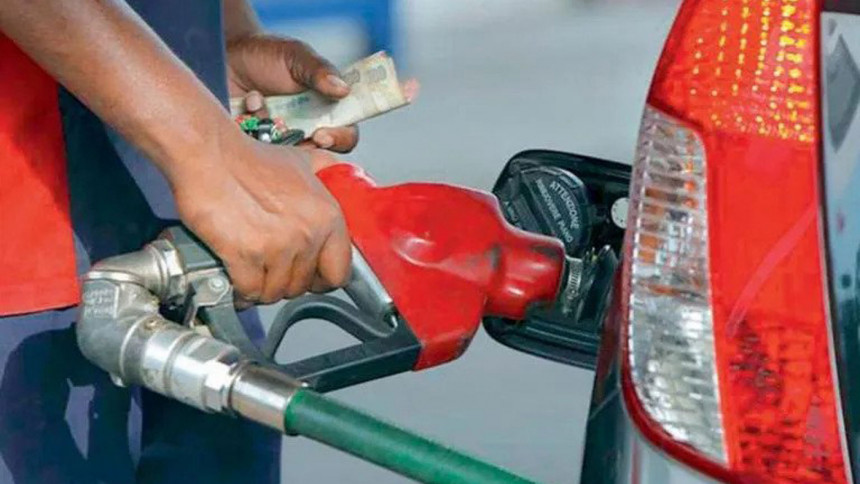The government’s decision to impose an astronomic hike in fuel prices is irrational as it comes at a time when the general public is losing its purchasing power amid record inflation following the hardships brought on by Covid-19.
Economists recommend the government review its decision to increase fuel prices as it should have been avoided during such a tough period for the country.
As per the new prices, a litre of octane now costs Tk 135, up 51.7 per cent from Tk 89.
Similarly, the cost of each litre of petrol has risen by Tk 44, or 51.1 per cent, to Tk 130, according to a press release from the Ministry of Power, Energy and Mineral Resources.
Likewise, the price of each litre of diesel and kerosene has reached Tk 114 from Tk 80, it added.
“Thanks to the price hike, the purchasing power of low-income and fixed income people will further deteriorate considering the recent inflation,” Prof Mustafizur Rahman, a distinguished fellow of the Centre for Policy Dialogue (CPD), told The Daily Star yesterday.
“At least kerosene prices could be out of the price adjustment as poor people use it,” he added.
Inflation soared to a nine-year high of 7.56 per cent in June. Data for that month shows that average inflation in the just-concluded fiscal year was 6.15 per cent, overshooting even the revised target of 5.7 per cent for the year, according to the Bangladesh Bureau of Statistics.
The increase in fuel prices is higher in the domestic market compared to the international market due to the devaluation of the local currency against the US greenback, Rahman said.
The inter-bank exchange rate for US dollars was Tk 94.70 last week, up 11.67 per cent year-on-year. At the same time, the exchange rate soared over Tk 110 in the open market.
As the tax-GDP ratio is low in Bangladesh, the government has little fiscal space to bear the rising subsidies for fuel but the adjustment could be softened by lowering the duty on fuel imports.
Tax collection as a percentage of the country’s GDP has long been stuck at around 7.6 per cent, the lowest in South Asia and one of the lowest in the world, according to the Ministry of Finance.
“Now, transport costs will be higher but it should not be more than the cost of fuel,” Rahman added.
The economist then expressed doubt over whether fuel and transport costs would drop even if the price of imported fuel is lowered.
Rahman recommends going for natural gas exploration both offshore and onshore to address the issue.
The decision to raise fuel prices was taken suddenly even though it should have been taken in steps as such a big rise will be costly for the economy, said Ahsan Mansur, executive director of the Policy Research Institute (PRI).
The main impact of the price hike will be on individual consumers, particularly those in urban areas, as transport cost are going to be higher.
However, a positive impact is that the government’s fiscal management will be easier as the subsidy pressure will soften now, said Mansur, a former economist of the International Monetary Fund.
The government allocated Tk 82,745 crore, or 1.90 per cent of the country’s GDP, as subsidies for fuel, electricity, gas, and fertilizer in the budget for fiscal 2022-23.
So, if the prices were not adjusted, the subsidy pressure would have soon surpassed Tk 100, 000 crore.
“But the government should have a mechanism to give subsidy for public transport to reduce the woes of general people,” Mansur added.
Prof Selim Raihan, executive director of the South Asian Network on Economic Modeling, said although it was necessary to adjust fuel prices to reduce the subsidy pressure, costs have risen abnormally.
“I don’t see any justification to raise prices to such an extent. The price hike will impact the peoples’ livelihoods and economic activities, especially that of the agricultural sector and SMEs who are already in a tight corner due to the pandemic and high inflationary pressure,” he added.
Raihan went on to say the government should have a transparent mechanism to adjust fuel prices in the local market so that any changes are in line with the international market, as is the case in India.
“Corruption and mismanagement in the sector should also be curbed,” he said.
The government could reduce the roughly 30 per cent tax, including VAT, on fuel in order to provide relief to the people in such a tough period, added Raihan, also an economics professor at the University of Dhaka.
He too recommended reviewing the price hike as such a rise seems illogical.
But even if the price hike continues, there should be a protection plan for the agricultural and SME sectors, Raihan said.
M Asaduzzaman, former research director of the Bangladesh Institute of Development Studies, said inflation will only increase further, pushing up food inflation in rural and urban areas as well.
“So, the question is timing. International petroleum prices have been on a downturn in recent days so this is a bad timing [for hiking fuel prices],” he added.
Asaduzzaman agreed that while the price adjustment was called for, the question is why was there such a sudden astronomical spike.
“Now, the cost of adjustment will very high,” he said.

